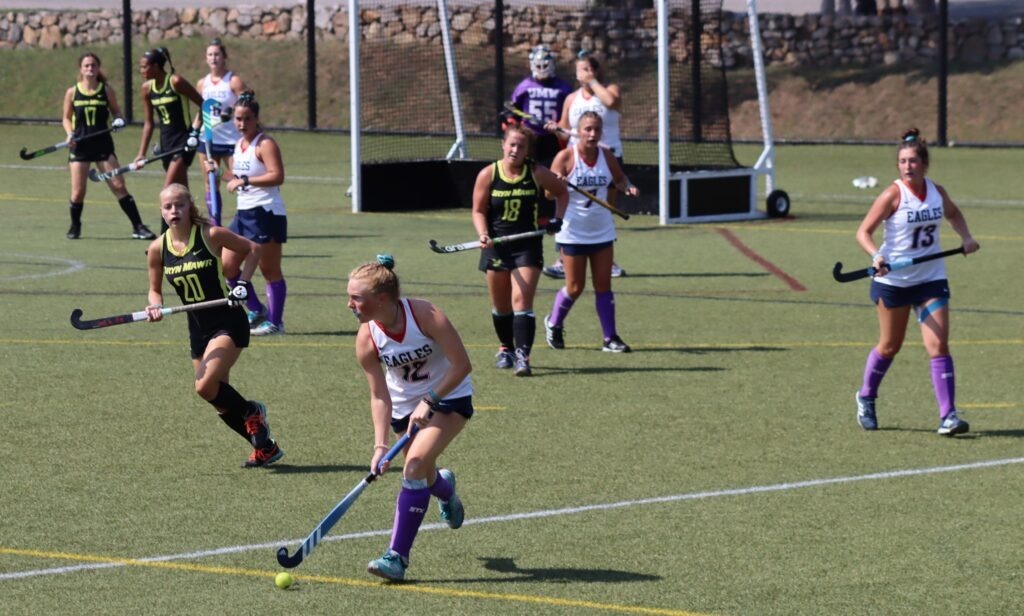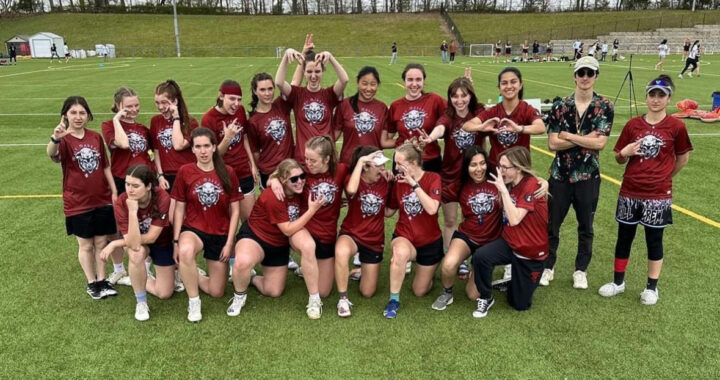Field Hockey dedicates game to Morgan’s Message
5 min read
Ellie Helbling dribbles the ball upfield. | Sarah Sklar, The Weekly Ringer
by EMILY HEMPHILL
Sports Editor
UMW’s field hockey team held their first Morgan’s Message dedication game this past Sunday for their home match against Bryn Mawr College. The Eagles fell to Bryn Mawr, 1-3.
Morgan’s Message is an organization started in honor of Duke University lacrosse player Morgan Rodgers who took her own life in 2019 at the age of 22, following a long struggle with depression and anxiety that was exacerbated by a career-ending knee injury two years prior. The non-profit works initiate more conversations regarding athletes’ mental health as well as “eliminate the stigma surrounding mental health within the student-athlete community and equalize the treatment of physical and mental health in athletics,” according to the Morgan’s Message website.
Senior political science and American studies double major Caperton Beirne, one of the field hockey captains, and her teammate, sophomore psychology major Jessica Wood, submitted applications to become Morgan’s Message ambassadors over the summer. They wanted to dedicate one of their home games during September as it is Suicide Prevention Month, which provided an opportunity to hold more conversations regarding mental health resources and some of the difficulties of being a student-athlete.
The second leading cause of death for student-athletes is suicide, following cardiovascular issues, as found by a study released in the Journal of the American College of Cardiology. Athletes already possess a competitive mindset by nature and these ambitious pressures only get amplified by athletic departments, coaches and teammates at the collegiate level. When this is combined with academic and social stress, student-athletes’ mental health can be the fallout.
“There’s a level of pressure that comes from being put in that box,” said Beirne. “In season, it’s a lot of pushing through. Having to get good grades, having to be a good athlete, but also having a social life and trying to sleep. Pulling yourself in all of the different directions can be tough. There’s definitely times when you need a break, but you can’t get a break.”
Beirne and Wood ordered teal-colored scrunchies for both UMW and Bryn Mawr players to wear in their hair for the game, and UMW’s players traded their usual navy blue socks for purple, as the colors of Morgan’s Message are teal and purple. They also brought in some of the organization’s bracelets and teal ribbons for the event.
As players lined up along half-field before the game, the announcer gave a brief statement about the dedication and cause. Following this was nine seconds of silence in honor of Rodgers, as she wore the number nine on her lacrosse jersey. Teal and purple were speckled throughout the stands, which became more and more filled as the game went on.
Though the teams battled in the heat and the Eagles went into halftime up by one point, the Eagles lost to Bryn Mawr. Bryn Mawr tied it early into the second half and secured the win with two points in the fourth quarter, though the Eagles continued to fight to the final minute.
“We played very well as a team and fought till the end,” said Beirne after the game. “It was also nice that Bryn Mawr’s team wore their teal and Morgan’s Message merch and even though we were playing against each other, we could still stand together for the same cause. All our parents wore teal and purple for our game, even our tailgate had teal table cloths. It was definitely exciting to see those small tributes work for a bigger cause.”
The UMW women’s soccer team also dedicated a home game to Morgan’s Message on Sept. 10 against Marymount University. To spread awareness about Morgan’s Message, they all wore temporary butterfly tattoos—representing the organization’s butterfly logo—on their arms, gave a pre-game announcement and posted on their Instagram account several days leading up to the game.
One of the captains, Macy Mockenhaupt, a senior biomedical sciences major, learned about the group online and knew it was important to bring up with her team.
“We had very positive feedback,” said Mockenhaupt. “They liked that it was something new and something that we brought awareness to, not that we didn’t talk about before, but something that just wasn’t ever really brought up on our team before.”
This past spring saw an increase in the number of student-athletes who committed suicide, some of which garnered significant media coverage like Stanford University’s women’s soccer goalie Katie Meyer and James Madison University’s softball catcher Lauren Bernett. The recent national attention on mental health in sports has inspired more conversations within athletic programs and teams across the country.
“I think that just made it real for some people,” said Mockenhaupt about this past spring. “Obviously we don’t play D-I, so it’s a little different, but we all experience the same issues and same pressures. I think it was good to bring awareness to that because I realized those girls are our age … I just don’t want it to ever be too much [pressure] for someone on our team.”
Wood agreed that while the current conversations tend to focus on D-I athletics, the pressures on athletes permeate all levels of sports.
“Athletes have this front that they put up where they think ‘I’m supposed to be mentally strong and physically strong,’” said Wood. “I feel like a lot of athletes see mental health as being weak. If I’m having a bad day or feeling sad, then I don’t want to feel like I’m putting that on anyone else.”
Beirne and Wood also noted a new emphasis on mental health resources for athletes from the UMW athletic department, including weekly check-ins with athletic trainers, a therapist specifically for athletes and addressing the topic in team and department meetings for the first time.
Assistant athletic trainer Katie Carnaghi is coming into her first year at UMW with a focus on supporting athletes physically and emotionally. Known for the stack of coloring books and snacks available in her office, Carnaghi hopes to create an encouraging environment for players.
“I think this athletic department does a pretty good job of checking on their athletes,” said Carnaghi. “The athletic training staff has a new survey that only comes to us trainers called the PHQ9, and it’s basically just a check-in with them like, ‘How are you feeling?’ thing. If it comes up with concerning stuff then we go check in with them and talk to them.”
She also mentioned working with the Student-Athlete Advisory Committee to start a new program toward the end of September called “Eagles, Let’s Talk” that will focus on the mental aspects of sports: body image, healthy eating habits, supporting teammates through injuries and managing stress.
Members of both teams are looking to continue the tradition of Morgan’s Message games in the future and encourage more conversations to take place within teams regarding mental health.
“I definitely think that campaigns like Morgan’s Message are all great organizations to get involved with,” said Carnaghi. “The more that we can spread word about those organizations then the more help athletes can get and they can have those resources and know that those resources are there and that they’re not alone.”











